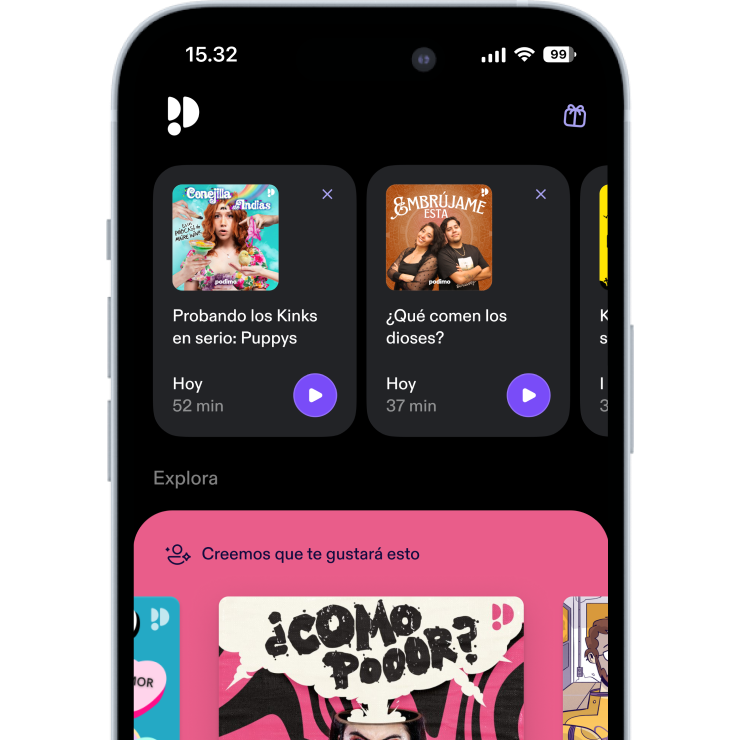
The Conversation
Podcast de BBC World Service
Empieza 7 días de prueba
$99 / mes después de la prueba.Cancela cuando quieras.

Más de 1 millón de oyentes
Podimo te va a encantar, y no estás solo/a
Rated 4.7 in the App Store
Acerca de The Conversation
Two women from different parts of the world, united by a common passion, experience or expertise, share the stories of their lives.
Todos los episodios
541 episodiosThe global housing crisis continues to grow, with the UN’s urban development agency estimating 40% of people worldwide lack access to adequate housing. Datshiane Navanayagam talks to female architects in Tanzania and Spain designing cheaper, more sustainable homes. Victoria Heilman founded the Tanzania Women Architects for Humanity (TAWAH), a group of architects, engineers, quantity surveyors and scientists. TAWAH tackles housing poverty and gender inequality by teaching women construction skills. The training enables them to build affordable, environmentally friendly homes for elderly residents who would otherwise be living in unsafe and uncomfortable housing, at a time in their lives when they are most vulnerable. Cristina Gamboa is a Spanish architect and co-founder of Lacol, a cooperative of 14 architects established in 2014 in Barcelona. The group design homes, offices, community buildings and art spaces that are environmentally sustainable, affordable and bring people together. Produced by Jane Thurlow (Image: (L) Victoria Heilman courtesy Tanzania Women Architects for Humanity. (R) Cristina Gamboa credit Lacol.)
Two women from Greece and Sweden tell Datshiane Navanayagam about the dog training process and the prejudices service dogs still face when it comes to broader societal acceptance. Lia Stoll is a Greek-Canadian guide dog trainer and co-founder of Lara Guide Dogs school in Greece. She was inspired by her father, who was also a guide dog mobility instructor, as Lia grew up with guide dogs and working with people who are blind and partially sighted. Anki Celander is a dog behaviourist and trainer who co-founded an assistance dog school in Sweden and now helps people with disabilities to train their own dogs to become certified assistance animals. She has over two decades of experience. Produced by Emily Naylor (Image: (L) Lia Stoll courtesy Lia Stoll. (R) Anki Celander courtesy Anki Celander.)
Two women from Italy and the US tell Datshiane Navanayagam about following the movements of growing wolf packs in Yellowstone National Park and the Italian Alps. Elisa Ramassa started work as a park ranger in Italy's Gran Bosco di Salbertrand, near Turin, in 1997. That same year the park recorded the first sightings of a wolf pack. They'd been extinct in the Italian Alps since the 1920s. She's spent the whole of her career tracking the local wolves, observing pack behaviour and family structures, while watching the population re-establish itself. Erin Stahler is a biological science technician and the programme manager for the Yellowstone Wolf Project. Wolves were reintroduced to the park in 1995 and there’s now 10 packs making up a steady population of around 100 wolves. She says the wide open spaces of Yellowstone National Park make it a perfect place for studying the fascinating behaviour of wolves. Produced by Jane Thurlow (Image: (L) Elisa Ramassa courtesy Elisa Ramassa. (R) Erin Stahler credit NPS.)
Two women from Australia and Germany tell Ella Al-Shamahi about their work in robotics: from tackling loneliness with humanoid companions to making industrial robots more accessible. Australian Grace Brown began building robots at 15, but it was the isolation of pandemic lockdown - five months without human contact - that led her to create Abi, a friendly humanoid companion robot inspired by Disney and Pixar characters. Working in secret while her family believed she was completing her master’s degree, Grace instead launched Andromeda Robotics from her bedroom, testing early prototypes in Melbourne nursing homes to help combat loneliness. Grace was recently named one of Forbes Australia's 30 under 30. Maria Piechnick is a German engineer and co-founder of Wandelbots, a company passionate about making robotics accessible to everyone. Her mission is to democratize the field of robotics and enable small and medium sized businesses to be able to deploy robots for any task with ease and efficiency. Maria's work spans a wide range: from enabling a cake company to decorate its products with robotic arms to developing advanced systems that safely defuse unexploded bombs from the Second World War. Produced by Emily Naylor (Image: (L) Maria Piechnick credit Wandelbots. (R) Grace Brown credit Andromeda Robotics.)
Two women from Nigeria and the Czech Republic speak to Ella Al-Shamahi about what it's like to lead adventurous expeditions for other women to countries not usually on the tourist trail. Lenka Hrabalová is an expedition guide and academic from the Czech Republic. Her PhD focused on the destruction of cultural heritage in the Muslim world. Lenka uses her knowledge to lead adventurous expeditions across the Middle East and North Africa, many exclusively for women. She is the author of several books including Sahara Stories and Mosaic of Iran. Temi Popo from Nigeria has always loved to travel. She was inspired by her grandmother’s legacy as a pioneering diplomat and educator, as well as having lived in seven countries. Temi is the founder of Girls Trip Tours, a travel company that aims to transform the tourism industry in Africa by centring women. They create travel experiences that empower women while uplifting local communities throughout Africa. Produced by Emily Naylor (Image: (L) Temi Popo credit Khalipha Nkloko. (R) Lenka Hrabalová credit Petr Florián.)

Rated 4.7 in the App Store
Empieza 7 días de prueba
$99 / mes después de la prueba.Cancela cuando quieras.
Podcasts exclusivos
Sin anuncios
Podcast gratuitos
Audiolibros
20 horas / mes























